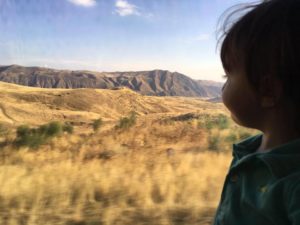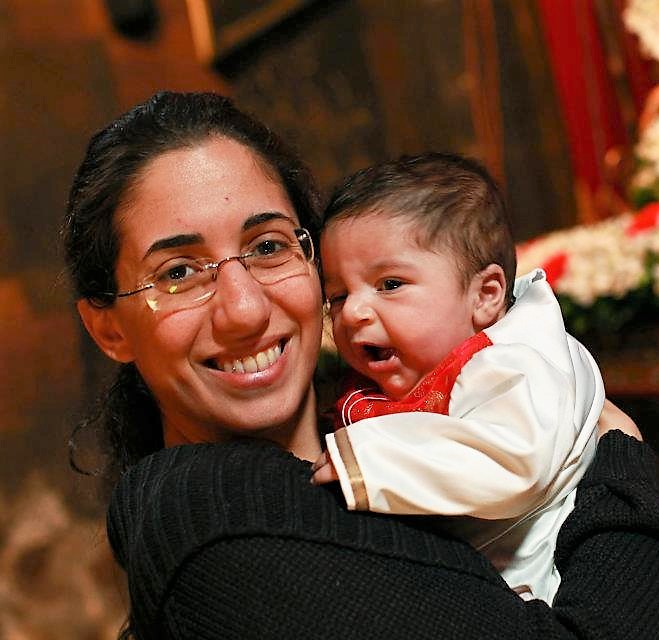
My first-born started speaking late. He grew up surrounded by multiple languages, including three different dialects of Armenian, maybe even four. People told me to keep speaking different languages and eventually he would start speaking all at the same time. Once we realized we would stay in Armenia for the long-term, the decision was obvious: focus on his English.
We realized he had heard enough Armenian for it to “be in his ears,” as they say. It was time to help him focus on English so that he could begin talking, especially since we noticed he was struggling to communicate. He picked up English quickly. Also during this time, we enrolled him in mankapartez [kindergarten], where the lessons were primarily in English. So I believed he was on the road to success.
Very few people in Armenia had an opinion, but as visitors came and went, I noticed many Diasporans would ask why I’m not teaching him Armenian.
Take a minute to think about that.
I now live in Armenia, and my son is now two years old. The knee-jerk reaction when any Armenian parent from abroad hears a child speak English is always… if you don’t teach him Armenian now, how will he learn?
I understand it. The fear is in our DNA at this point. We have been fighting assimilation for so long, we don’t know how to stop.
The fear is in our DNA at this point. We have been fighting assimilation for so long, we don’t know how to stop.
Growing up in the suburbs of Washington, D.C., I struggled with my own identity. I understood Armenian on a basic level, but I barely spoke it. It’s not because my parents didn’t teach me. I was enrolled in a local Armenian Sunday school, where I learned some history and how to read and write. I grew up in the Armenian Youth Federation (AYF) and participated in almost every Armenian event that I could find. When I turned 20 years old, I moved to Boston just so I could be closer to the Armenian community that inspired me.
But I still couldn’t do it. I still couldn’t find the Armenian words to express my thoughts, not until I moved to Armenia. Suddenly I was forced to embarrass myself with bad grammar and questions about the meaning of certain words. Lehzoos patsvetsav. I started to open up.
My son had just turned three years old when he began to converse with our nanny in Armenian. His grammar was completely off, but he’s three, he doesn’t care. He’s at that age when it’s ok to say it wrong first to learn how to get it right. Now? He knows two languages pretty well, and even knows which language to use when speaking to different people, including strangers. The other day, he said a word I didn’t understand. When I asked him about the origin of the word, he said, “It’s Russian, Mama.” I still couldn’t figure out what it meant, but he knew.
In his mankapartez, he’s surrounded by dozens of other children who speak a lot of different languages. Many of the kids do not live in Armenia year round, but they come for extended periods. English, Russian, Italian, German, Arabic and Armenian—these are all the languages my son hears on a daily basis. He is exposed to diversity.
But at the end of the day, my children are growing up in Armenia. They will regularly attend concerts at Opera. They stare at Mount Ararat from our living room window. They will go to museums and art shows to learn the Armenian culture. They will breathe the air and stomp the grounds.
Better yet, they will be contributing to an evolving culture. For too long, I read books about an Armenian history as if that was all that’s left. When I moved to Armenia, I realized the Armenian culture never ended. It still lives and breathes with every beat of a drum, with every stroke of a brush, with every written word and every breath. The next generation has shown us what is possible. The creativity and humor of the new generation can only lead to the next steps of our nation. We will carry the torch for our ancestors. And I don’t have to “force my kids to speak Armenian” in order to carry that torch. All I have to do is make sure they are fed and healthy, going to school and making friends.
What does this mean for the Diaspora? Well, that’s the beauty of it all. When I grew up, the idea of visiting Armenia was rare. Armenia wasn’t independent and borders were hardly open. Now, Armenians come and go through Yerevan like any other transient city. New generations of Diasporans are learning to speak Armenian the same way I did.
We have a chance to fight assimilation with simple geography. Maybe it’s not a perfect clean dialect of Armenian. That doesn’t exist in our social worlds. But the path for survival is clear, and Armenia holds the key. You don’t have to live here to gain the benefits. You just have to be willing to spend some time here.
This summer, I noticed a number of families spend significant amounts of time in Armenia, traveling and participating in different summer programs. For some, there was a choice that had to be made: Camp Haiastan or Armenia? I hope more people can do both.
My one year old started to speak early. I can thank his nanny for that. She speaks with him constantly. His first words were the usual: Baba, Mama, Nene, Avo (his brother), and then quickly came the other words: avto [car], ator [chair], Arsen (the neighborhood dog), kitig [nose], akanj [ear]. His English will come along soon too; I’m quite sure he’ll follow his older brother everywhere. At least that’s one less thing I need to worry about.
Author information
The post Identity Shouldn’t Be So Hard appeared first on The Armenian Weekly.
Source: Armenian Weekly
Link: Identity Shouldn’t Be So Hard

